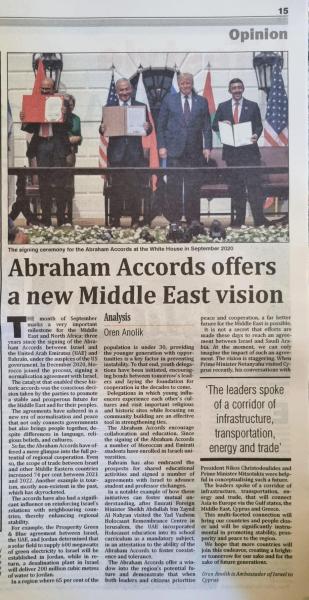September marks a very important milestone for the Middle East and North Africa: three years since the signing of the Abraham Accords

𝗧𝗵𝗲 𝗔𝗯𝗿𝗮𝗵𝗮𝗺 𝗔𝗰𝗰𝗼𝗿𝗱𝘀: 𝗖𝗲𝗹𝗲𝗯𝗿𝗮𝘁𝗶𝗻𝗴 𝗧𝗵𝗿𝗲𝗲 𝗬𝗲𝗮𝗿𝘀 𝗼𝗳 𝗥𝗲𝗴𝗶𝗼𝗻𝗮𝗹 𝗖𝗼𝗼𝗽𝗲𝗿𝗮𝘁𝗶𝗼𝗻
The month of September marks a very important milestone for the Middle East and North Africa: three years since the signing of the Abraham Accords between Israel and the United Arab Emirates (UAE) and Bahrain, under the auspices of the US government. In December 2020, Morocco joined the process, signing a normalization agreement with Israel.
The catalyst that enabled these historic accords was the conscious decision taken by the parties to promote a stable and prosperous future for the Middle East and for their peoples.
The agreements have ushered in a new era of normalization and peace that not only connects governments but also brings people together, despite differences in language, religious beliefs and cultures.
So far, the Abraham Accords have offered a mere glimpse into the full potential of regional cooperation. Even so, the scope of trade between Israel and other Middle Eastern countries increased 74% between 2021 and 2022. Another example is tourism, mostly non-existent in the past, which has skyrocketed.
The accords have also had a significant influence on reinforcing Israel's relations with neighboring countries, thereby enhancing regional stability. For example, the Prosperity Green & Blue agreement between Israel, the UAE, and Jordan determined that a solar field to supply 600 megawatts of green electricity to Israel will be established in Jordan, while in return, a desalination plant in Israel will deliver 200 million cubic meters of water to Jordan.
In a region where 65% of the population is under 30, providing the younger generation with opportunities is a key factor in preventing instability. To that end, youth delegations have been initiated, encouraging bonds between tomorrow's leaders and laying the foundation for cooperation in the decades to come. Delegations in which young influencers experience each other's cultures and visit important religious and historic sites while focusing on community building are an effective tool in strengthening ties.
The Abraham Accords encourage collaboration and education. Since the signing of the Abraham Accords a number of Moroccan and Emirati students have enrolled in Israeli universities. Bahrain has also embraced the prospects for shared educational activities and signed a number of agreements with Israel to advance student and professor exchanges.
In a notable example of how these initiatives can foster mutual understanding, after Emirati Foreign Minister Sheikh Abdullah bin Zayed Al Nahyan visited the Yad Vashem Holocaust Remembrance Center in Jerusalem, the UAE incorporated Holocaust education into its school curriculum as a mandatory subject, in an attestation to the ability of the Abraham Accords to foster coexistence and tolerance.
The Abraham Accords offer a window into the region’s potential future and demonstrate that when both leaders and citizens prioritize peace and cooperation, a far better future for the Middle East is possible.
It is not a secret that efforts are made these days to reach an agreement between Israel and Saudi Arabia. At the moment, we can only imagine the impact of such an agreement. The vision is staggering. When Prime Minister Netanyahu visited Cyprus recently, his conversations with President Christodoulides and Prime Minister Mitsotakis were helpful in conceptualizing such a future. The leaders spoke of a corridor of infrastructure, transportation, energy and trade, that will connect Asia to Europe via the Gulf states, the Middle East, Cyprus and Greece. This multi-faceted connection will bring our countries and people closer and will be significantly instrumental in promoting stability, prosperity and peace to the region.
We hope that more countries will join this endeavor, creating a brighter tomorrow for our sake and for the sake of future generations.
